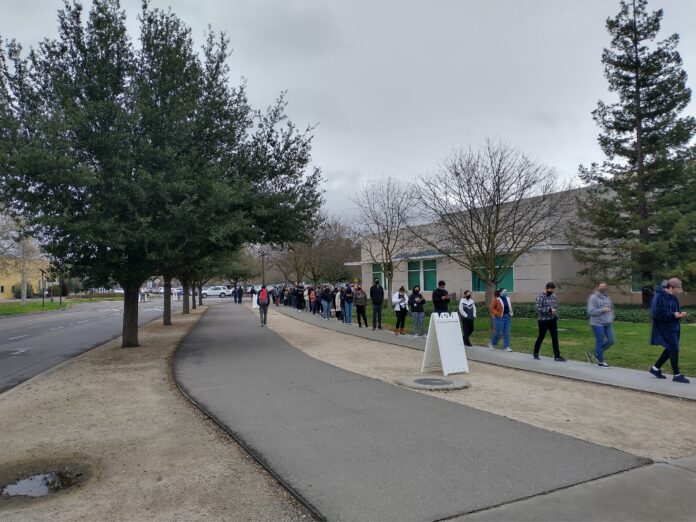As more students test positive for COVID-19, UC Davis Housing scrambles to get apartments prepared for new residents
By KATHLEEN QUINN— campus@theaggie.org
UC Davis’ isolation and quarantine housing are over half full as omicron sweeps through the student body. As of Jan. 10, 59% of available beds have been filled.
Most students who tested positive for COVID-19 cannot relocate to quarantine housing since quarantine and isolation housing at Primero Grove, the only current location for isolation housing, consists of approximately 250 beds.There have been 1,113 positive results among students alone in the last seven days, constituting a positivity rate of 5.02%.
Alyssa Vallejo, a second-year computer science and engineering major who lives at the Tercero residence hall, said she tested positive on Jan. 3 and was moved into quarantine housing by the fourth.
“Someone from housing called to inform me that I tested positive for COVID and that they would be sending an email explaining how they were going to go about isolation housing,” Vallejo said.
Alayna Davidson, a third-year history major who lives at The Green, tested positive for COVID-19 on Jan. 2 and received an email from Housing that said they would receive a phone call from a contact tracer, but no follow-up call came.
“Twenty-four hours passed and I didn’t hear from them, so I called the next day on the third,” Davidson said. “The response I got was, ‘Just wait and see because someone will contact you.’”
Davidson said that as of Jan. 8, no one had reached out to them, and they have been self-quarantining in their room in an apartment shared with two other students at The Green.
Julia Ann Easley, a news and media relations specialist at UC Davis, said that the process for who is isolated has changed as of Jan. 2 to reserve isolation for residence hall students.
“Because of that, students who test positive for COVID-19 and live in apartments — on or off campus — would generally be asked, if possible, to isolate in a room of their apartment,” Easley said via email.
Alex Shvakel, a third-year medical and molecular biology student, tested positive on Jan. 3, and self-isolated in his room at The Green.
“After day one, you are pretty much on your own in isolation,” Shvakel said. “They do send emails in the e-Health saying to take your isolation survey, and they send text reminders about it.”
According to Easley, the staff of Student Health and Counseling Services work together to provide services and support for students while in isolation.
“Support includes health care, dining, instructional support and other services as needed,” Easley said via email. “Meals are provided by a dining commons. Students are given a contact to call if they need anything while in isolation.”
Vallejo said that when she arrived at her isolation accommodation around 4 p.m., there was frozen food available but no microwave. She contacted Housing and Dining Services to find a solution.
“She told me ‘Oh well, unfortunately we can’t get you microwaves yet,’” Vallejo said. “They instructed me to use a delivery service which was not ideal.”
The next day, she received a microwave and Housing and Dining Services offered her a refund through Aggie cash.
Vallejo, who is fully vaccinated and boosted, said even with her booster, it was difficult for her to attend courses over Zoom due to fatigue throughout the week.
“I would wake up around 8 a.m., would make myself some breakfast, I would try to attend lecture and then I would fall asleep by 1 p.m.,” Vallejo said. “It was a continuous cycle where I would wake up, eat, take a nap and then got back to sleep around 10 [p.m.]”
As of Jan. 9, Vallejo is no longer in quarantine after testing negative for COVID-19 using an antigen test, but she still has some mild symptoms.
“Students need to isolate for 10 days from the day any symptoms started or the day you took your test, whichever is earlier,” Easley said via email. “After five days, if the student does not have symptoms or if any symptoms are resolving, he or she can end isolation upon a negative antigen COVID-19 test (not the PCR test performed at the ARC).”
Shvakel said he was advised to not take the PCR test after he finished quarantine.
“They don’t allow you to test negative on their PCR test because they say that if you have the antibodies, you may possibly test positive for 90 days,” Shvakel said.
Davidson said their symptoms were mild beyond a bad cough and a headache, but they are more concerned about long COVID-19.
“I’m concerned about issues in my chest, like having a lingering cough,” Davidson said. “I’m concerned about how long the cough will go on.”
Shvakel said he feels lucky that he was able to quarantine in his room at The Green.
“I got lucky in that single room,” Shvakel said. “But for the people in the dorms, I feel like that is where a lot of the cases are coming from because they really have no choice.”
Easley said that as of Jan. 10, students in residence halls will now need to test once a week through Jan. 31 with the possibility of an extension to that requirement.
“With the increase in transmissibility of omicron, it is important that we continue to identify and isolate asymptomatic positive cases, especially among students living in high-density housing,” Easley said via email.
Easley said that if Primero Grove does fill up with students from the residence halls, they will designate additional areas for isolation housing.
Written by: Kathleen Quinn— campus@theaggie.org









